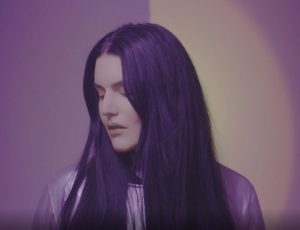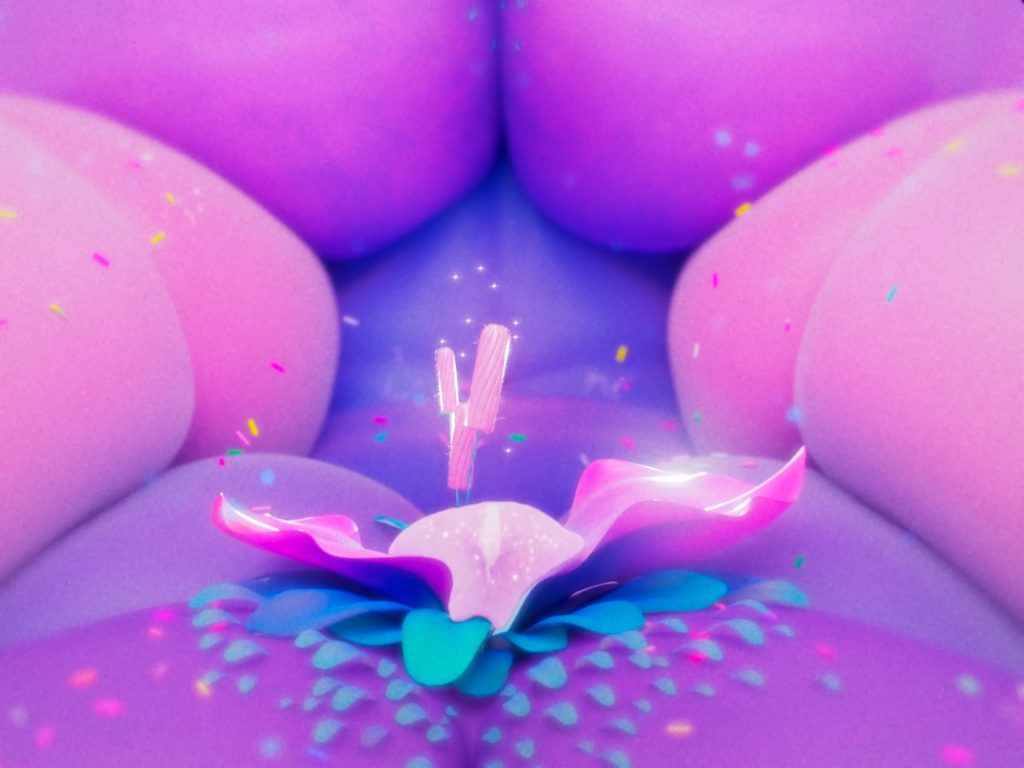Interview with Bea Höller
Introducing our featured filmmaker: Bea Höller
‘Animation is a perfect tool for visualizing sexuality.’
Where did your filmmaking career begin, and what made you want to be a filmmaker?
I was still very, very young when I knew I wanted to do something that could be shown on television. I come from a very rural area, and there, no one really knew what kind of training one could pursue in the field of films. So, at first, I decided to pursue a graphic design apprenticeship, and through various connections, I stumbled upon Florian Satzinger (Duckland creator). He taught me how to draw characters and where to find schools that strengthen these skills. It’s worth mentioning that there wasn’t much information available on the internet in our area at that time. This doesn’t mean I’m ancient :D, but as I said, things are different in the countryside – call me the Queen of chickens :D.
Anyway, I then moved to Hamburg and attended the Animation School there for a year. This school, which no longer exists, was so excellent that I learned how to animate and all the essential aspects of image creation within a year. Of course, I knew I had to learn much more and try everything that was available. So, after that, I went to the Film Akademie in Baden Württemberg. This university is simply the dream of every filmmaker. For five years, I experimented with various techniques and programs. You also push your limits there. You’re so young and think everything isn’t that difficult – just let it happen. But for the first time, I reached my limits there. For example, motivating a team or ensuring everyone is doing well, because you simply work for days. As a director, you have to make decisions and hope they are the right ones. But moments when your team is happy and proud are simply beautiful. I also realized during Klimax that perspectives change. The fact that everyone could suddenly talk about sexuality without problems, and how proud and confident we felt after so much work, was simply amazing.
During this time, I also became clear about what is important to me as a filmmaker. I wanted to share my knowledge of self-acceptance and sexuality. I struggle so much with societal pressure that I am aware of how important unity and self-belief are. And it’s even more beautiful to experience this with a team and an audience. That’s why filmmaking, at least for me, is something beautiful.
I’ve often talked about the disparities for female and minority filmmakers in Hollywood. What is the industry like in Germany where you are based?
It’s hard to say. Sometimes, I feel it’s just a passing trend. Like, let’s take a woman to strengthen our image, and oh, let’s create a women’s theme to win more awards and enhance our image. On one hand, I appreciate it because it gives women the opportunity to step forward, but on the other hand, one would like to be taken seriously because the work is simply brilliant. I think both men and women make great films; it’s just different. Whether it’s the perspective, a different sensitivity, or other experiences one wants to share outwardly. Whatever it is, it should be regarded with the same seriousness as films made by men. One thing I can say from Germany, at least, is that we are not quiet – we are loud as long as we need to be.
Animation is also an area of the industry where it has been traditionally male dominated. What drew you to make an animated film? What do you like about animation?
Animation was my first entry into the world of film. The first movies and series I watched were anime and Disney films. I’ve always been a keen drawer since childhood. I used to sketch all the characters from the films and invent my own Pokémon. Since my path was a bit chaotic, it wasn’t until later at the Animation School that I truly understood what animation means and how it works.
The reason I now find animation so fascinating is that with animation, you can create forms that are more challenging to achieve in live-action films. It’s essential to remember that animation is also a perfect tool for visualizing sexuality. It’s already a taboo topic, and animation doesn’t immediately deter the viewer, making everything more accessible.
Who have been some of your inspirations as a filmmaker throughout your career, and what do you admire about them?
I have always been inspired by many people, and I’m talking about friends I’ve met over the years. Each individual is truly unique in their own way, in terms of their thinking and what they have experienced. It’s the stories that each person tells me that inspire me. Of course, I watch an exaggerated number of movies and series; not many things impress me, but about 2-4 films a year really evoke a lot of emotions in me. Then I’m so happy that I’m grateful to have the chance to make films.
I know you might want examples now, but if I start, I won’t stop. I can only say that currently, I really enjoy watching Korean and Japanese films and series. They surprise me and make me both cry and laugh. I also love drawing inspiration from the 80s and old anime, especially regarding looks and colors.
The idea of making a film about women’s pleasure, sexual pleasure to be precise, can seem so taboo or even dangerous throughout history. What made you want to explore this topic?
So, I come from Austria, and my grandmother is also Italian. In Europe, sexuality is definitely approached more openly than in America, at least that’s my feeling. I was also informed about it at a very early age, for which I am very grateful to my mother. It’s just the most natural thing in the world, so I have no fear about it. On the contrary, I will always speak openly about it. I enjoy exploring, and I like it when people are a bit shocked and wake up a little.
Let’s talk about your short animated film “Klimax.” How did the idea come about?
It’s hard to say; it’s not like I wake up with everything I want to do already planted in my head. I don’t always have a system for building an idea. On the contrary, with “Klimax,” it was anything but easy for me. I knew I wanted to explore sexuality because it resonates with me and deeply interests me. I started by interviewing women, asking very intimate questions such as how they envision their vulva/yoni, how often they’ve had orgasms in their lives, and how often they touch themselves. The answers were not what I expected. I was shocked, but more so by the amount of self-hate and discomfort expressed by each woman, despite their inner and outer beauty. I couldn’t comprehend it.
So, I decided to create a film about an orgasm, attempting to depict it solely for the woman and without male assistance. A journey towards self-love, if you will. As I mentioned before, I’m often inspired by the 80s, so I had to include a Barbie from that era in this case. Partly because, to me, she was perfect even as a child. I wanted to deconstruct this beauty ideal and took her as a symbol, specifically focusing on her proportions. The Barbie doesn’t have any negative connotations in this context; on the contrary, she served as professional inspiration for both girls and boys. In “Klimax,” I use her to reinterpret the concept of the perfect beauty ideal. Gradually, the entire film came together. The most challenging part was conveying the desired feeling of an orgasm. I can truly say that was anything but easy!
What are the general attitudes toward female pleasure in Germany? Here in the US, while we objectify the female body on film and in advertising, patriarchal and regressive ideas are still quite dominant culturally. Is it like that where you live?
Certainly. Even though body shapes are portrayed differently in advertisements and films, it often seems like just a passing trend, and that’s something that often makes me think. It feels more like a patch being placed on a leak, and the hope is that, as long as it’s fresh every now and then, the water won’t break through. Attitudes towards the body and sexuality are improving, but there are still far too many people who prefer a regressive mindset and want to revert to the old ways. It’s terrible, but unfortunately, it’s still prevalent, even in Germany.
There’s also something to be said about being “allowed” to showcase female sexual pleasure in animation, because what we’re seeing is not actually human. Can you talk about censorship and how this plays a role not only in film but in real life conversations about pleasure?
This topic often infuriates me. I am not a fan of censorship, at least not until one is old enough. Art should be free, and, in my case, one should be able to navigate freely through sexuality in art. I think Klimax is absolutely not a film where censorship should even come into play. Klimax is highly abstract, and there is no reason for censorship. Our world is what it is, and if you start censoring, you’ll end up overlooking and ignoring a lot. This could lead to not knowing many things or repeating mistakes.
Regardless of my films, I also enjoy discussing sexual topics in general. At parties or over after work beers, people talk about various things, including sex. However, I often find myself in situations where others can’t even say the word “sex.” When discussing simple things, like, for example, “You do know that there are different vulva shapes, and each one is unique,” people in the group turn around to see if anyone heard, because it makes some uncomfortable. Maybe they prefer me to say something like “sushi” instead of “vulva” 😀 I don’t know, but censorship is often experienced, even if it happens unconsciously.
What is your message to female viewers who watch “Klimax?”
Explore and discover yourselves and have as many orgasms as you can. It’s something entirely natural and beautiful, allowing you to feel what you are: invincible and strong.
What kind of cultural attitudes do you hope will change around female sexuality and pleasure through films like yours?
I wish that not every woman thinks she has to be perfect because such a person doesn’t exist, and I hope women don’t conform to the visual and sexual desires of men. Either someone loves or respects you as you are, or they should leave. I also wish that films like Klimax and others strengthen or bring back women’s self-confidence after so much suppression by men.





